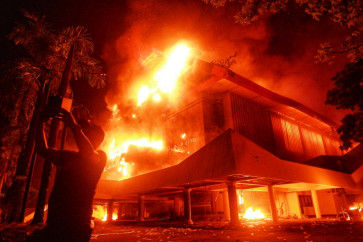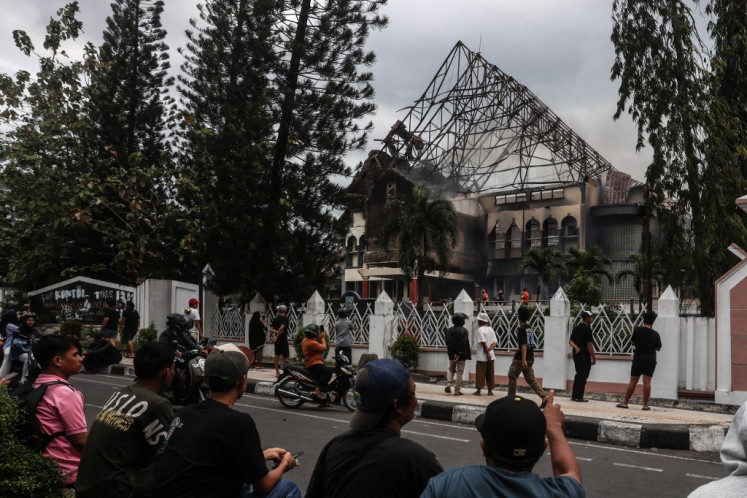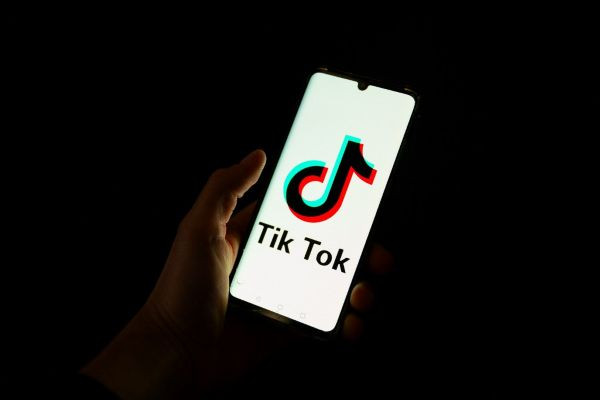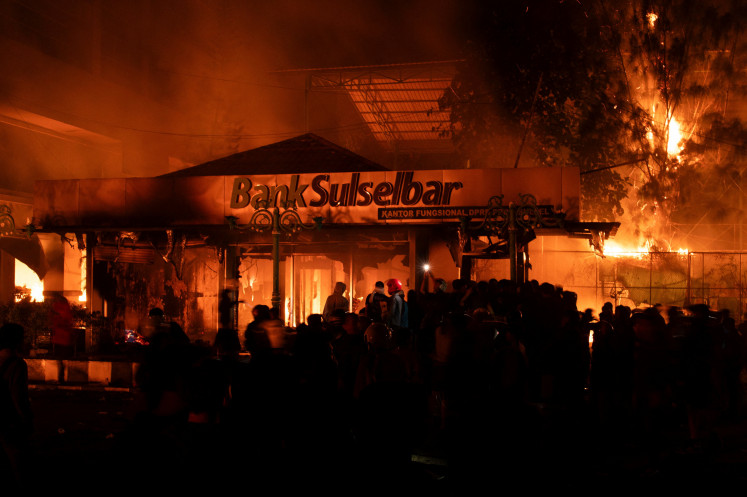Popular Reads
Top Results
Can't find what you're looking for?
View all search resultsPopular Reads
Top Results
Can't find what you're looking for?
View all search resultsBosowa boss tells of humble beginnings, rivalry with Kalla
Family affairs: (From left to right) Bosowa Corporation founder Aksa Mahmud, wife Ramlah and eldest child Erwin celebrate the company’s 40th anniversary in Makassar, South Sulawesi, in this file photo
Change text size
Gift Premium Articles
to Anyone
F
span class="caption" style="width: 558px;">Family affairs: (From left to right) Bosowa Corporation founder Aksa Mahmud, wife Ramlah and eldest child Erwin celebrate the company’s 40th anniversary in Makassar, South Sulawesi, in this file photo. Established in 1973, Bosowa is now one of the country’s major companies, with strong presence in eastern Indonesia. (Antara/Yusran Uccang)
Aksa Mahmud, founder of conglomerate Bosowa Corporation, is a self-made businessman. Despite his lack of business education, he managed to build a US$1.2 billion business empire from scratch and became one of the nation’s richest people.
Aksa developed his business sense at an early age while growing up in a small village in Lapasu, South Sulawesi.
“I have always wanted to make my own money. At school, I used to sell candy, cakes, whatever snacks I could get my hands on. I also sold ice blocks and dates during the fasting month,” the 67-year-old said while sipping coffee at his Aryaduta hotel in Makassar, South Sulawesi.
At present, Bosowa is one of the most successful companies in the country, with a strong presence in the eastern part of Indonesia. It spans a wide variety of sectors, from infrastructure to finance.
It currently runs a cement business through PT Semen Bosowa Indonesia and PT Semen Bosowa Maros, a car dealership with Mitsubishi and Mercedes-Benz brands, and a transportation business with taxi and air services. Bosowa also holds 14.3 percent and 21.7 percent stakes in the publicly listed PT Nusantara Infrastructure and PT Bank QNB Kesawan, respectively.
Aksa learned basic business principles from his father, who was a farmer. Aksa’s father used to bring crops to Makassar to be sold. “He was not a businessman per se, but the purpose of his activities was to gain profit and that is what business is all about,” Aksa said.
At junior high school, the young Aksa “upgraded” his business when he partnered with a local fisherman. Aksa would bring the latter’s products, such as mother of pearl, to the city to be sold and would return a few days later.
The partnership with the fisherman made him realize the importance of developing trust in business. “The fisherman would not give his products to other people to be sold even though I was away for days. He was sure I would come back with his money,” Aksa recalled.
He established his first company, CV Moneter, in 1973. It became the official car dealership of Japan’s Datsun in South Sulawesi in 1978 and changed its name to PT Moneter Motor.
A few years later, Moneter Motor was appointed by Mitsubishi Motors to be its dealership for the eastern part of Indonesia. The company underwent a name change once again and became PT Bosowa Berlian Motor. “Then everything stemmed from there,” Aksa said.
Two years after starting his own business, he married Ramlah Kalla, the daughter of prominent Makassar businessman Hajji Kalla and the younger sister of former vice president Jusuf Kalla. Aksa and Jusuf have known each other since their days at Hasanuddin University in Makassar.
The couple have five children: Erwin, Sadikin, Melinda, Atira and Subhan. According to Aksa, he wanted them to get a taste of the “rough” life by sending them to high schools outside Makassar, far from the family. “They must be able to survive by themselves without the luxuries they received at home,” Aksa said with a firm tone.
He sent Erwin and Sadikin to Bandung, West Java; Melinda to Singapore; and Subhan to an Islamic boarding school in Sukabumi, West Java. Atira was the only one who spent her senior high years in Makassar, but she could not enjoy the convenience for too long as she was later sent by Aksa to the US for college.
After turning Bosowa into a business empire, the patriarch stepped down six years ago and now the company is run by Erwin as CEO, with Sadikin managing its finance and Subhan overseeing its operations.
Meanwhile, Melinda runs the social aspect of the firm through Bosowa Foundation and Atira handles what Aksa calls “the family fund”. They set aside some of the company’s profits for the family fund to make sure each member of the family got equal facilities and to prevent jealousy, Aksa added.
He admitted to having been grooming Erwin — and not his other children — to be his successor, citing Erwin’s capacity as the oldest child to lead his siblings. “Even if I have faith in Erwin, I have always demanded of him to prove to his brothers, sisters and other people that he is the right person for the job,” he added.
Due to the generation gap between them, father and son sometimes find themselves involved in debates over the company’s policies. “We are different because Erwin started from theory to practice, while I began from practice to theory,” Aksa said, adding that when a disagreement occurred, they would hold a discussion to find their middle ground.
He said that he always challenged his children to expand Bosowa multiple times over, even telling Erwin not to be defeated by the Kalla Group, the conglomerate operated by his in-laws. While Kalla markets Toyota cars, Bosowa offers Mitsubishi. Besides the automotive industry, the two companies compete in other sectors as well, such as construction and property.
Business is business, even though his wife Ramlah, as a member of the Kalla family, continues to hold her share of ownership within the Kalla Group. Once Aksa tried to persuade her to let go of her stakes. “I told her, ‘Do you not trust me, your husband, to provide for you?’ She refused, saying that the shares were the legacy of her father. But I am sure she will always support me and our children even though she is a Kalla Group shareholder,” Aksa said.
Aksa also denied rumors that he started his business with money borrowed from the Kalla family. “Definitely not,” he said. “I got the startup funds from [state-owned] BNI.”
This year Bosowa has prepared several projects, which include the expansion of its cement, power plant and financing businesses. Erwin also said that the company expected to reap a total of Rp 20 trillion ($2.06 billion) in revenues by 2014.
According to Aksa, he always insists that his children gain people’s trust. “I will not be very sad if they become poor, but it will break my heart to find out that they cannot be trusted by people,” he said. “It will also shorten my life.”
Commenting on the future, he estimated that cement would remain Bosowa’s core business within a 10-year period, driven by growing economic development. “We want to be on the list of the top three cement producers. Our short-term target is to overtake Holcim [the third-largest cement manufacturer] by 2015,” he said, smiling.










